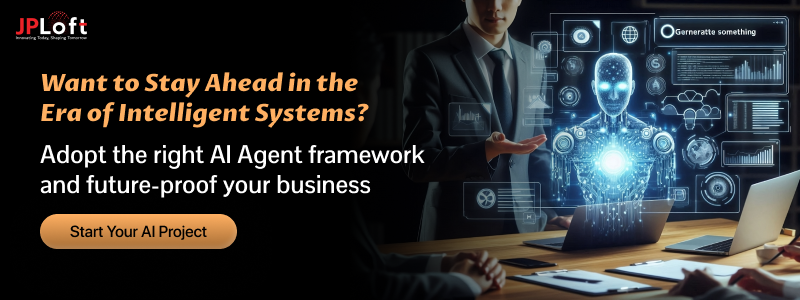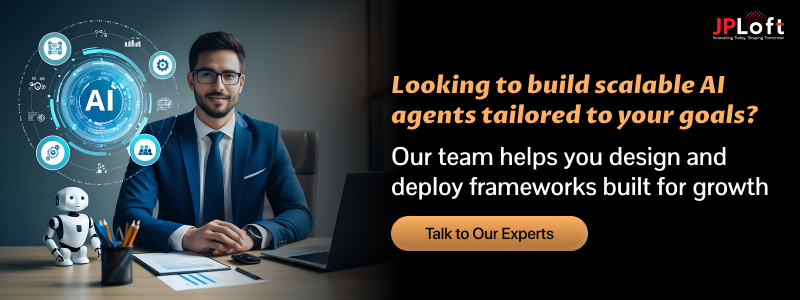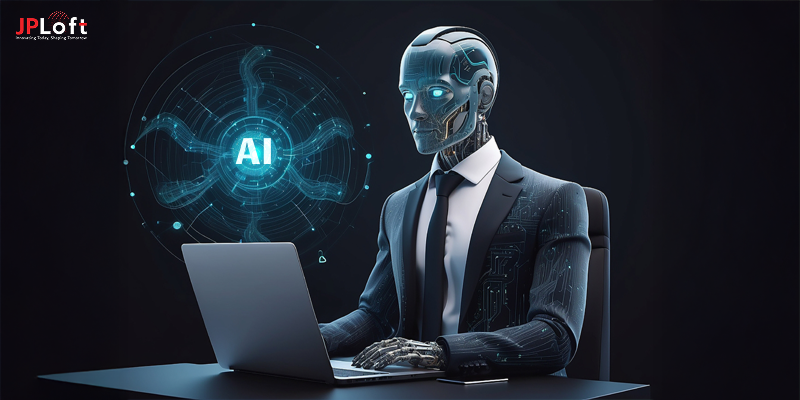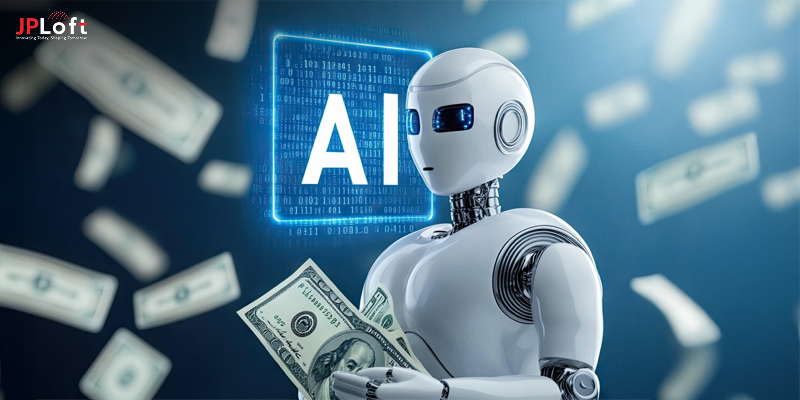Key Takeaways:
The best AI Agent frameworks for 2025 include LangChain, LangGraph, AutoGen, Semantic Kernel, CrewAI, LlamaIndex, and OpenAI Agents SDK—each offering unique strengths for businesses.
Adopting the right AI Agent framework boosts ROI by reducing vendor lock-in, enhancing security, and scaling efficiently with growing organizational needs.
Security and compliance remain critical, with frameworks needing built-in guardrails, encryption, and GDPR/HIPAA readiness to safeguard sensitive business data.
Low-code and no-code platforms democratize AI adoption, enabling non-technical teams to build and deploy agents quickly without heavy developer involvement.
Future AI frameworks will emphasize multi-agent collaboration and domain-specific use cases, driving innovation in industries like healthcare, finance, and logistics.
JPLoft helps businesses build robust AI Agent frameworks, offering end-to-end development, custom integrations, and compliance-driven solutions that deliver long-term scalability and competitive advantage.
"The future belongs to those who prepare for it today." – Malcolm X
This quote resonates strongly in today’s AI-driven era, where adopting the right technology defines tomorrow’s success.
In this context, one of the most pressing questions is: “What are the best AI Agent frameworks for 2025?”
The answer lies in robust solutions such as LangChain, AutoGen, Semantic Kernel, and CrewAI; frameworks designed to empower businesses with scalable, intelligent, and secure AI agents.
Selecting the right framework is not just about tools; it’s about making a strategic investment in innovation, compliance, and efficiency.
Are you an entrepreneur, startup, or business leader looking for the right AI Agent framework to develop your own AI Agent?
The real question is, which framework will give you scalability, security, and innovation without unnecessary complexity?
By exploring the leading options for 2025, you’ll understand which frameworks dominate the market and how to select the one that best aligns with your long-term business vision and growth strategy.
Let’s get started.
What is an AI Agent Framework?
Before we start learning about selecting the best AI Agent, let’s consider learning about the basics first.
► Concept
An AI Agent Framework is an organized collection of tools that gives developers the fundamental building blocks to create and implement AI agents. Rather than manually coding each function, developers employ frameworks to implement agents that can reason, plan, remember, and interact with the outside world.
► Purpose
The goal of an AI agent framework is to ease development and normalize intelligent capabilities, allowing organizations and developers to more easily deploy scalable, production-grade AI solutions. Through the use of frameworks, organizations save time and expense while gaining assurance of reliability.
► How It's Applied in an AI Agent?
Frameworks supply critical modules such as:
-
Reasoning & Planning – determining the next best action.
-
Memory – maintaining context from previous interactions.
-
Integrations – integration with APIs, apps, and databases.
-
Safety & Guardrails – enabling ethical and compliant AI actions.
► Market Stats
The market for AI agents is growing quickly, expected to exceed $1811.75billion by 2030, with more than 70% of businesses using AI agents by 2025.
This growth underscores the need for strong frameworks. Companies that implement AI agent frameworks early on will be best placed to construct smarter, scalable systems and derive a competitive edge.
Now, with this growing range and popularity of AI Agents in the diversified markets, it's essential to look for frameworks used in their development.
Let’s learn about the reasons to consider an AI Agent framework in the following section.
Why is Selecting the Right AI Agent Framework Important?
When you proceed to develop an AI Agent, it's essential to look for the designs, tech stack, and its security parameters, right?
Well, considering the AI Agent tech stack can be considered similar to the framework.
Let’s consider a scenario, an AI Agent can be considered as an employee, and the framework can be considered as a factory that provides all the infrastructure and tools to work.
Here is the detail of the reasons why selecting a suitable AI Agent framework is crucial.
1] Expanding Market Demand
The AI agent market size was valued at USD 5.25 billion in 2024, and is expected to grow from USD 7.84 billion in 2025 to USD 52.62 billion by 2030 at a CAGR of 46.3%.
By selecting the right AI Agent framework, businesses can capitalize on this explosive growth, ensuring they remain competitive instead of falling behind with outdated solutions.
2] Alignment with Business Needs
Not all off-the-shelf frameworks fit every company. Selecting the most suitable AI Agent framework ensures customization options, whether it’s integrating with your internal systems, handling domain-specific reasoning, or scaling for enterprise-level workflows.
This flexibility ensures your AI works exactly the way your business demands.
3] Long-Term Cost Efficiency
While some frameworks may seem cost-effective initially, subscription-based models can lead to high recurring costs.
By carefully selecting an AI Agent framework that balances upfront investment with long-term scalability, companies can achieve a stronger ROI and reduce vendor lock-in.
4] Stronger Data Security & Compliance
With growing concerns over data privacy and regulations like GDPR and HIPAA, businesses must ensure compliance.
Choosing a framework with built-in guardrails, secure integrations, and compliance features gives companies confidence that both customer trust and legal standards are upheld.
5] Competitive Advantage & Innovation
Businesses that select the right AI Agent framework can innovate faster.
With features like multi-agent systems, flexible workflows, and advanced APIs, companies can differentiate themselves in the market by creating smarter, more tailored solutions than their competitors.
6] Support for No-Code & Low-Code Adoption
Many modern AI Agent frameworks provide visual, drag-and-drop interfaces and pre-built templates.
This empowers non-technical business teams to define goals, configure workflows, and deploy AI agents without needing coding expertise, making adoption faster and more inclusive across organizations.
Now, as we evaluated the reasons to select the best AI Agent framework, let’s evaluate the potential areas and factors to consider for selecting an AI Agent framework in the year 2025.
Are you ready to proceed? Let’s learn it in the section below.
Key Criteria for Selecting an AI Agent Framework in 2025
When you decide to convert the AI agent project ideas into reality, one of the important elements is the factors impacting its building.
You cannot think of proceeding with an AI Agent if you do not draw the framework here.
Let’s evaluate the following areas for selecting an AI Agent framework in the year 2025.
A] Scalability & Performance
While choosing the optimal AI Agent framework, scalability becomes paramount. As your company expands, the framework should support greater data volumes, additional users, and sophisticated workflows without lagging behind.
An actually scalable framework guarantees future-proofing, enabling enterprises to scale up without having to recreate their AI infrastructure.
B] Interoperability & Integrations
The top AI agent framework must seamlessly integrate with APIs, databases, CRMs, and third-party applications.
By 2025, companies will be dependent on a wide range of tech stacks, and a non-interoperable AI Agent framework will build silos. Smooth integrations enable your agents to process real-time data and conduct tasks effectively across platforms.
C] Security & Compliance
With increased concerns regarding AI ethics and regulations, security is not negotiable when choosing an AI Agent framework.
Consider frameworks that provide strong guardrails, data encryption, and compliance with standards like GDPR and HIPAA. Secure frameworks safeguard sensitive business and customer information while maintaining trust.
D] Flexibility & Customization
Each company has individualized workflows and needs, and that is why flexibility is important in choosing the most appropriate AI Agent framework.
A framework must enable developers to customize reasoning, memory, and tool integrations without being tied to inflexible templates. This makes sure the AI agent suits your particular business goals.
E] Community & Ecosystem Support
Upon choosing the top AI Agent framework, a robust developer community can be a deciding factor.
Active communities offer updates, plugins, bug fixing, and common best practices, shortening development cycles. An ecosystem-backed framework will be more stable and innovative in the rapidly evolving AI sphere.
F] Cost & Resource Efficiency
The best AI agent framework balances functionality with affordability. While some frameworks charge high subscription or usage fees, others provide open-source flexibility.
The discussion of the top AI Agent frameworks in 2025 goes hand in hand with the growing conversation around AI Agents vs Agentic AI, highlighting how the industry is moving toward more autonomous and goal-driven models.
Considering both upfront and long-term costs, including development, scaling, and maintenance, helps businesses choose a framework that maximizes ROI without hidden expenses.
Top AI Agent Frameworks in 2025
In this fast-paced environment, it's critical to identify the most suitable AI Agent framework.
However, as an entrepreneur looking to enter the AI Agent business or wanting to create a personalized AI Agent for your business, selecting the framework is valuable.
Hence, the question that arises is “What are the top AI Agent frameworks to consider in 2025?”
You can select the AI agent frameworks among LangChain, LangGraph, AutoGen, Semantic Kernel, CrewAI, and many more.
Let’s learn them all in detail in the following section.
1. LangChain
LangChain is the most popular AI agent framework, used to connect LLMs with external data sources, tools, and APIs. Developers can chain prompts, reasoning, and memory to build sophisticated agents.
It features an enormous open-source ecosystem with pre-made integrations and is referred to as the default framework for startups and enterprises. It also enjoys an enormous developer base, which translates into fast support and innovation.
2. LangGraph
LangGraph is an extension of LangChain but with graph-based state handling. It represents agent workflows as state machines and is well-suited for predictable, controllable, and fault-tolerant systems.
It is particularly useful for enterprise software that demands reliability and transparency in decision-making. It aids teams in debugging and observing AI behavior more efficiently.
3. AutoGen (Microsoft)
AutoGen is Microsoft's multi-agent orchestration platform, where agents interact through natural language. It has pre-configured agents such as Planner, Developer, and Reviewer.
This makes it ideal for multi-step workflows such as code generation, research, and automation. Its natural language orchestration also simplifies it for non-technical users to configure workflows.
4. Semantic Kernel (Microsoft)
Semantic Kernel is a model-agnostic software architecture for embedding AI into business systems in terms of "skills" and "planners." It is platform-independent and runs on several programming languages such as Python, C#, and Java.
It's most suitable for enterprise applications where integration with legacy systems and compliance are top priorities. Backed by Microsoft, there's huge support and scalability.
5. OpenAI Agents SDK (Swarm)
OpenAI’s Swarm SDK is a minimalist yet powerful toolkit for building lightweight agents. It focuses on core elements like tools, guardrails, and handoffs between agents.
Its simplicity makes it production-ready for teams that need fast deployments without unnecessary complexity. Since it’s backed by OpenAI, it benefits from constant updates aligned with GPT advancements.
6. CrewAI
CrewAI facilitates collaboration among role-based AI agents, in which multiple agents collaborate like a team. It's especially good for solving complicated tasks that necessitate parallel specialization.
Its role-driven architecture enables companies to describe agents as "researchers," "planners," or "executors," ensuring collaboration is structured and transparent.
7. LlamaIndex
LlamaIndex excels at linking agents to structured and unstructured data sources, making it ideal for retrieval-augmented generation (RAG).
It manages memory and embeddings well. It's particularly good in knowledge-intensive applications such as enterprise search, research platforms, and intelligent assistants that are dependent on big data sets.
8. Smolagents / Pydantic AI Agents / Strands Agents
These lighter-weight libraries are usually applied in research or experimental setups. They provide modularity, allowing developers to try out smaller, domain-specific agent behaviors.
Though less capable than LangChain or AutoGen, they are great for prototyping, instruction, and rapidly experimenting with new architectures.
9. Low-Code Platforms (Langflow, N8N, Botpress, Flowise)
They allow teams to visually design agents with drag-and-drop workflows. They're perfect for firms without extensive AI knowledge who need quick deployment.
The lo-code platforms are wonderful for industries with heavy automation and enable quicker iteration cycles, although they might not offer the fine-grained control that coding-first platforms do.
10. Emerging Research Frameworks (AgentLite, AutoAgent, Cerebrum, Eliza, NekroAgent)
-
AgentLite – light, excellent for researchers to develop modular agents in a hurry.
-
AutoAgent – a non-code solution for technical users to create and deploy agents.
-
Cerebrum (AIOS SDK) – modular framework for agent development, discovery, and scaling.
-
Eliza – expertise in Web3 integrations, facilitating agents to communicate with smart contracts.
-
NekroAgent – expertise in multi-user chat platforms, with plugins and sandboxed execution.
These frameworks are new but reflect the experimental frontier of AI agents of 2025, pushing the envelope in both academia and real-world applications.
|
Framework |
Strengths |
|
LangChain |
Flexible agent chains with a rich ecosystem and integrations |
|
LangGraph |
Graph-based decision workflows |
|
AutoGen |
Natural language-based multi-agent orchestration |
|
Semantic Kernel |
Enterprise integrations with security and compliance |
|
OpenAI Agents SDK |
Lightweight and production-ready agents |
|
CrewAI |
Team-based, role-driven agent collaboration |
|
LlamaIndex |
Data-rich memory and retrieval setups |
|
Low-Code Platforms |
Quick build with minimal coding (e.g., Langflow, N8N) |
|
Research Frameworks |
Lightweight experimentation (AgentLite, AutoAgent, Cerebrum) |
Now, another parameter, which might bother you, is related to cost. Well, after selecting the framework, an entrepreneur will look to adopt it, right?
Hence, let’s look forward to the following section.
Cost of Adopting a Suitable AI Agent Framework in 2025
What’s the Cost to adopt a suitable AI Agent framework?
On average, the cost to adopt and implement an AI Agent framework can vary from $40,000 to $100,000.
Well, there are certain factors that will impact your selection costs, such as the complexity of the AI agent, the skills of the developers, the location of the developers, and much more.
Let’s evaluate all the factors impacting the selection cost of an AI Agent framework in the table defined below.
|
Factor |
Impact on Cost |
|
Complexity of Features |
Basic agents cost less, while advanced features like memory, planning, and multi-agent collaboration increase expenses. |
|
Integration Needs |
Connecting with APIs, CRMs, ERPs, or custom systems adds to development cost and time. |
|
Data Security & Compliance |
Implementing GDPR/HIPAA compliance, encryption, and guardrails requires additional resources and audits. |
|
Customization Level |
Highly tailored frameworks cost more than using pre-built, off-the-shelf components. |
|
Scalability Requirements |
Designing for enterprise-scale users or high workloads demands more infrastructure and optimization. |
|
Ongoing Maintenance |
Updates, monitoring, and model retraining add recurring yearly costs beyond initial development. |
Well, whether it's about identifying the overall cost to create an AI Agent or the cost of selecting an AI Agent framework, you should be aware of the factors impacting them. As they play a crucial role in changing the decision over the AI Agent.
Till now, we have covered the concepts of AI agent frameworks, why to select one, key areas to look for in the selection of the best, a complete list of the best AI agent frameworks, and the relevant cost figures.
Now, let’s look forward to the challenges that you might come across while selecting the best AI Agent framework for your project.
Challenges to Consider When Choosing the Best AI Agent Framework
What are the top challenges to consider when selecting the prominent AI Agent Framework?
The list of challenges comprises of threat of seamless integration, poor scalability, inaccuracy of the data security, and many more.
Yes, when you start your own AI agent or go to implement one for your business, you might face several challenges to build an AI agent.
Similarly, to select an appropriate AI agent framework, you should check out the prominent list of issues or challenges that you might face.
Let’s learn them all in detail.
Challenge 1: Threat of Seamless Integration with Current Systems
Most companies already use CRMs, ERPs, or LMS applications. One of the biggest hurdles is to make sure the AI Agent framework integrates well with these applications without re-engineering at great expense.
Selecting a framework that has minimal API or plugin integration will limit adoption and produce silos.
Challenge 2: Poor Scalability and Performance
Not all frameworks are capable of supporting enterprise-class workloads. Some are great for pilot projects but fail under large-scale deployments.
Companies need to thoroughly assess whether the framework is capable of scaling over multiple teams, locations, or use cases without sacrificing speed or efficiency.
Challenge 3: Lack of Data Security and Compliance
With standards such as GDPR, HIPAA, and AI Act tightening up, companies are struggling to ensure compliance.
Numerous frameworks offer rudimentary protection but do not always offer sophisticated compliance capabilities. The ideal choice of an AI Agent framework involves balancing innovation with good governance and safe handling of data.
Challenge 4: Ineffective Customization vs. Vendor Lock-In
Certain AI Agent frameworks provide velocity in the form of pre-existing modules but constrain flexibility. Others are highly customizable but demand higher technical proficiency.
Companies should steer clear of vendor lock-in, picking a framework that is both flexible and future-capable while reducing reliance on one vendor.
Challenge 5: Cost and Resource Allocation
Implementing an AI Agent framework is more than just a matter of licensing; it entails training, infrastructure, and regular updates. Surprises might come in the form of scaling, API use, or add-ons.
Companies need to balance short-term affordability with long-term ROI to prevent excessive spending.
Challenge 6: ROI and Effectiveness Measurement
Unlike traditional software, AI agents operate with adaptive behaviors, making ROI harder to measure.
Organizations may struggle to track productivity gains, user adoption, and cost savings. Selecting the right framework means also ensuring it offers clear reporting and analytics to evaluate impact.
These were all the challenges to consider when it's time for you to select the best AI agent framework.
Trends Shaping the AI Agents Framework
When it comes to leading the market, it's significant to opt for trends that create a diversified impact on your business’s ideal position.
Here’s what you need to evaluate in case of learning the key trends for Athe I Agents framework.
► Emergence of Multi-Agent Collaboration
AI agents are shifting away from solo-task assistants to collaborative multi-agent systems. These systems allow agents to collaborate like a team, researching, planning, and taking action on tasks in unison—making them perfect for intricate enterprise workflows.
► Merging AI with Enterprise Systems
Trendy frameworks focus on smooth integration with CRMs, ERPs, LMS systems, and cloud services. This is the way to ensure companies can integrate AI agents into routine operations with minimal effort, without friction, and thereby achieve greater efficiency.
► Data Privacy and Compliance Focus
As regulations such as the EU AI Act and GDPR get stricter, AI agent frameworks are incorporating more robust compliance functionality. Built-in governance, monitoring, and ethics guardrails will be customary features in 2025.
► Low-Code and No-Code Platforms
To reduce the complexity of AI adoption, vendors are creating drag-and-drop platforms where non-technical users can set up agents. This makes AI adoption more democratic, allowing companies to deploy agents rapidly with minimal developer dependency.
► Industry-Specific Use Cases
AI agent platforms are maturing away from general-purpose assistants. In 2025, we observe expansion across domain-specific platforms for healthcare, finance, education, and logistics—specifically designed to industry rules and processes.
► Growing Adoption of AI-Augmented Memory
Frameworks are introducing long-term and contextual memory, enabling agents to recall previous conversations, preferences, and choices. This technology trend makes agents more human-like, enhancing personalization and efficiency in business use cases.
Wondering about selecting an appropriate framework for your AI Agent, but confused about how!
The following section is for your help.
JPLoft’s Role in Helping You Build a Robust AI Agent Framework
We at JPLoft are experts at providing smart, scalable, and secure AI solutions that cater to business requirements. As a reputable AI Agent development company, we provide enterprise and startup clients with top-notch AI agent frameworks that automate, make processes more efficient, and enhance innovation.
We specialize in developing frameworks with high-end features like multi-agent cooperation, contextual memory, secure data management, and native API integrations. Whether you are looking to optimize customer interactions, automate processes, or create domain-specific AI agents for innovation, we ensure that your product is integrated with your long-term objectives.
Our process covers end-to-end development, from requirement analysis, architecture design, and development to deployment, testing, and ongoing maintenance. With expertise in AI, machine learning, and compliance-driven frameworks, JPLoft ensures your AI agent system is future-ready, secure, and cost-efficient.
Partnering with us means building more than just technology; it’s about creating a competitive edge for your business.
Conclusion
In 2025, adopting the best AI Agent framework is vital for businesses seeking scalability, efficiency, and long-term innovation.
The top AI Agents frameworks like LangChain, LangGraph, AutoGen, Semantic Kernel, CrewAI, LlamaIndex, and OpenAI Agents SDK are leading the way, each offering unique strengths for enterprises and startups.
Choosing the right option enables organizations to streamline operations, enhance customer engagement, and future-proof their digital ecosystems. With the AI agent market projected to surge dramatically by 2030, businesses that select and adopt these frameworks early will secure a strong competitive edge in the era of intelligent, autonomous systems.
FAQs
An AI Agent Framework is a toolkit that provides the core components—reasoning, memory, integrations, and guardrails—for building and managing AI agents efficiently.
Choosing the right framework ensures scalability, security, and cost-efficiency, helping businesses adopt AI agents that drive innovation and competitive advantage.
Some of the best AI Agent frameworks include LangChain, LangGraph, AutoGen, Semantic Kernel, CrewAI, LlamaIndex, and OpenAI Agents SDK.
The cost typically ranges between $40,000 and $100,000, depending on complexity, integrations, customization, and scalability needs.
Key challenges include integration with existing systems, ensuring scalability, managing compliance, avoiding vendor lock-in, and balancing long-term ROI.
For enterprise adoption, Semantic Kernel and AutoGen are strong options, as they offer scalability, compliance, and integration with large business ecosystems.













Share this blog